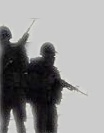 |






 AfricaSpeaks Weblog AfricaSpeaks Weblog
 Rootswomen Weblog Rootswomen Weblog
 Rootsie's Weblog Rootsie's Weblog
|
Rumsfeld's War
Posted: Friday, April 4, 2003
by Gwynne Dyer
American generals are not political innocents, though they have to act as if they were. When Lieutenant General William Wallace, the commander of American ground forces in Iraq, ruefully told journalists last Thursday that "the enemy we're fighting is different from the one we'd war-gamed against" and predicted a much longer war, he was launching a (deniable) cruise missile straight at the US Secretary of Defence, Donald Rumsfeld. Everybody in Washington knows that it was Rumsfeld who ignored professional military advice and insisted on "War Lite" in Iraq.
Rumsfeld and his civilian allies control the upper echelons at the Pentagon, and the war on Iraq was a chance for them to prove that they could carry out overseas interventions at low cost. (They have a long wish-list of such interventions: last month John Bolton, under-secretary of state for arms control, told Israeli officials that it would be "necessary to deal with" Iran, Syria and North Korea after the war in Iraq.) So when US professional soldiers who respected the Iraqi army's capabilities insisted that to invade Iraq they needed "heavy" forces as large as those used in the first Gulf War in 1991, Rumsfeld simply over-ruled them.
The head of the US army, General Eric Shinseki, a twice-wounded Vietnam veteran, wanted to move the 1st Cavalry Division from Texas and the 1st Armoured Division from Germany to the Gulf for the invasion, but Rumsfeld refused to send them. He wanted to prove that his project for re-ordering the world to America's taste by force could be done on the cheap, exploiting the military superiority that he and his neo-conservative cronies believed that US forces now had thanks to new technologies. If you have to send most of the US army just to deal with a country like Iraq, then it's such a big deal that you won't get to do it very often—but if you can do it with "ligh" forces, then it could become an almost annual event.
The conflict between the ideologues and the military professionals became so acute that Rumsfeld, unable to fire the army chief, took the unprecedented step of announcing Shinseki's successor's name 18 months in advance. By last December, the US armed forces were so alarmed by Rumsfeld's strategy that former Marine Corps commandant General James Jones, now commanding US forces in Europe, took the risk of publicly criticising "those who seem to think this is pre-ordained to be a very easy military operation" in an interview with the Washington Post.
In January General Norman Schwarzkopf, commander of US forces during the 1991 Gulf War, worried aloud in the same paper that "when (Rumsfeld) makes his comments, it appears that he disregards the army".
But Rumsfeld was the boss, which is why there are now fewer than 100,000 US combat troops in Iraq, why the operation has stalled before Baghdad, and why the Pentagon has belatedly ordered another 120,000 troops to the region (while insisting publicly that plans have not changed).
All those stupid, old-fashioned American professional soldiers were right after all. The Iraqi army turns out to be full of tough, brave men who are willing to die defending their country even if they don't love Saddam Hussein. They are using guerilla warfare, ambush tactics, even suicide attacks—anything that lets them avoid fighting out into the open where US air power would destroy them. Their long-term strategy remains to draw US forces into the cities and inflict massive casualties on them, but there are not currently enough American combat troops in Iraq to even think of fighting their way into Baghdad.
It will take at least until the end of April for all these reinforcements to reach the outskirts of Baghdad, and by that time other US positions in the Arab world may have been destroyed. Popular outrage in the Arab world at the US attack on Iraq is building by the day, and pro-American regimes are increasingly at risk. Then American troops must fight their way into Baghdad street by street in the May heat, probably losing a few thousand soldiers in the process. Of course, Iraqi losses will be twenty or fifty or a hundred times as great, and America will still win in the end—but the real problems start on victory day, because nobody in their right mind would want to occupy Iraq.
As General Shinseki told a congressional committee in February, the United States will need a force in the hundreds of thousands to police post-war Iraq. Rumsfeld immediately denied it, saying that the army chief was "far off the mark," and a ‘senior administration official' told the Village Voice newspaper that Shinseki's remark was "bulls--- from a Clintonite enamoured of using the army for peacekeeping and not winning wars." So General Shinseki, in an act of insubordination that stunned his colleagues, went right out and told another congressional committee the same thing.
The rupture between the ideologically driven civilians who run the Pentagon and the professional military is now almost complete. That is a recipe for a longer and messier war, leading to a post-war occupation regime that promises to be an utter nightmare. Welcome to Iraq.
 Printer friendly version Printer friendly version
 Send page by E-Mail Send page by E-Mail
|








